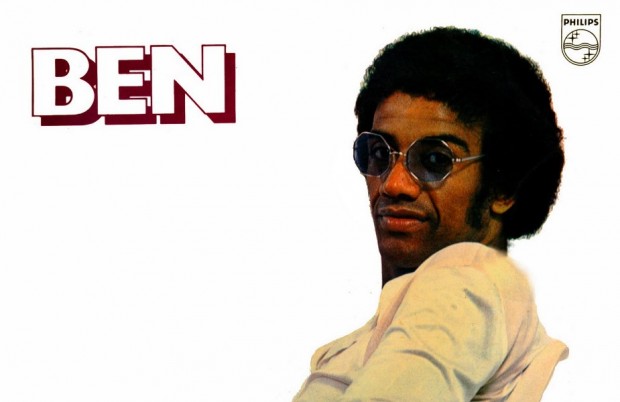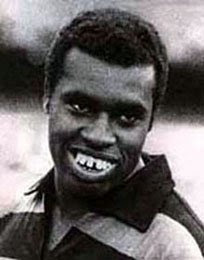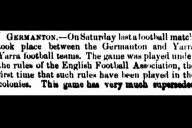10. “I Got Erection (St. Pauli version)” by Turbonegro (1998)
What do you think about Hansa Rostock?
Hansa Rostock? They are pussies, heavy metal pussies!
In 1998, Norwegian hard rocking deathpunk band Turbonegro reworked the lyrics of their 1995 single “I Got Erection” as a tribute to Hamburg football club FC St. Pauli. It first appeared on the 1998 compilation Der FC St. Pauli ist schuld, dass ich so bin!
You can also find it on their 2005 compilation Small Feces.
I‘m horny!
Yeah
Every time when I go to the stadium – Erection!
Every two weeks on the holy steps stand – Erection!
That’s right, supporting your football club can give you a raging boner.
9. “The Referee’s Alphabet” by Half Man Half Biscuit (2002)
John Peel loved HMHB so much they appeared on 12 John Peel Sessions.
“In a decently ordered society members of Half Man Half Biscuit would be routinely carried shoulder high through the streets of every city they visited.”
“If I did the lottery, which I don’t do, but if I won it, I should set aside a great sum of money to ensure that Half Man Half Biscuit never had to worry about money again, and could just go on making records: really for the rest of my life, and hopefully for the rest of theirs as well.”
And so should football referees.
HMHB’s “The Referee’s Alphabet” is a paean to the art of refereeing.
It’s also a piece of lyrical genius.
F is the farce into which most games would descend if we weren’t there
The G is for the gnarled face of someone who’s on £90,000 a week and reckoned he should have had a throw in
H is for handball, which has to be intentional, and very rarely is
If only people would study the rules more
8. “We Stand Around” by I, Ludicrous (1992)
We travel every Saturday,
We go wherever we play and pay,
spending money we can’t afford,
We are the fans, we go everywhere.
If there was literary prize for documenting the football fan experience in song it would go to South London’s I, Ludicrous with the epic “We Stand Around”.
Give those Crystal Palace fans a Pulitzer. Heck, give them a Nobel as well. Outstanding stuff.
We make a scene in every town
Our accents sting our voices loud
Old ladies in shop doors cower
We are the fans we have power?
Some have scars of well aimed boots
Some wear scarves some wear boots
The police escort eyes with ill disguised contempt
7. “Give Him A Ball (And A Yard Of Grass)” by Sultans of Ping FC (1993)
There are hundreds of reasons why Sultans of Ping FC are a better Irish band than U2.
Here are three:
1. They have a better name.
2. U2 have never written a song as good as the Sultans of Ping FC masterpiece that is “Where’s Me Jumper”.
3. U2 have never written a football song, which is a relief after what they have just done to poor Joey Ramone.
Sultans of Ping FC 3 – U2 FC 0
“Give Him A Ball (And A Yard Of Grass)” is a sparkling moment of football song genius inspired by the sayings of master football aphorist, Brian Clough.
The Sultans of Pings took Brian’s words:
“John Robertson was a very unattractive young man. If, one day, I was feeling a bit off colour, I would sit next to him. I was bloody Errol Flynn compared to him, but give him a yard of grass and he was an artist. The Picasso of our game.”
“If God had wanted us to play football in the clouds, he’d have put grass up there.”
And turned it into one of the great football sermons:
Give him a ball and a yard of grass, he’ll give you a move with perfect pass.
Give him a ball and a yard of space, he’ll give you a move with godly grace.
A man can’t have no greater love than give 90 minutes to his friends.
If God meant for the game to be played up there, he would’ve built pitches in the air.
If God meant game to be played up high, he would’ve built goal posts up in the sky.
Amen!
The song first appeared on Sultan of Ping FC’s 1993 album Casual Sex in the Cineplex. U2 never came up with an album title as good as that, either.
Sultans of Ping FC 4 – U2 FC 0
6. “The Game” by Tackhead (1987)
You know “The Message”, you know “White Lines”. Yes, those classic hip-hop songs released by Sugar Hill Records. Well, Doug Wimbish (bass), Keith LeBlanc (percussion) and Skip McDonald (guitar) were the Sugar Hill house band that laid down those famous tracks.
They headed to England in 1984 to hook up with master at the controls Adrian Sherwood and became Tackhead – pioneers of industrial (dub-laden) hip-hop.
“The Game” is a cracking example of the genre with Brian Moore’s commentary sampled over the Kop singing “You’ll Never Walk Alone” and Wimbish’s cavernous bass making your bottom end go all wobbly over some gloriously dissonant McDonald riffs.
(There is no video to this clip – but the sound works fine)
Want more? Then check out this clip from one of their legendary live shows as they perform a stonking rendition of “The Game” at the Town & Country in London in 1989.
5. “Sharp as a Needle” by Barmy Army (1987)
It was tough but there are two reasons why “Sharp as a Needle” finished one place above “The Game”:
1. I bought the 12-inch single for my Liverpool supporting cousin when it come out.
2. The song makes the hair on the back of my neck stand up.
The B-Side “England 2 – Yugoslavia 0” isn’t bad either.
Barmy Army was a studio project devised by master dub producer Adrian Sherwood for his On-U Sound label. With a bit of help from his Tackhead mates he went on to create the best album entirely dedicated to football in the history of music – The English Disease. A piece of music alchemy where football, fan culture and music come together in rub-a-dub style with songs like “Psycho + The Womble of Div. 1” and “Leroy’s Boots”.
Revel in the “glory, glory” that is “Sharp as a Needle”.
4. “Theme for Sparta FC #2” by The Fall (2004)
A simply brilliant song by The Fall and everybody’s favourite Manchester City supporter, the incorrigible Mark E Smith.
There are two versions of the song. The original “Theme for Sparta FC” came out on The Fall’s 2003 album Country on the Click. An alternative version of the tune, “Theme from Sparta FC #2” was released as a single in 2004 and also appeared on the U.S released The Real New Fall Album.
And what an improvement it was on the original. The song was let off the leash. It’s quicker, it’s sparser, it hisses, it fizzes. It’s got balls and bite. And when Mark and the band’s energy levels are up it sounds terrific live.
The song was also used on the BBC TV Saturday afternoon sport show Final Score, where on a now infamous occasion they got Mark E Smith to read out the football results.
English Chelsea fan this is your last game
We’re not Galatasary, We’re Sparta F.C.
3. “Ponta de Lança Africano (Umbabarauma)” by Jorge Ben Jor (1976)
If I was a football manager, the first thing I would do is install a proper soundsystem at the training ground and boom out Jorge Ben Jor’s stunning Africa Brasil, one of the great albums, not just from Brazil, but from mothership Earth.
The improvement would be immediate.
Everybody knows and loves Sergio Mendes + Brasil 66 “Mas Que Nada”, some might even know and love Sergio Mendes + Black Eyed Peas “Mas Que Nada”.
At the tender age of 18, precocious Jorge Ben wrote “Mas Que Nada” in 1963. Here is the Jorge Ben with the original “Mas Que Nada”.
As he grew older, Jorge Ben Jor, influenced by the soul and funk coming out of the US from the likes of James Brown and the rhythms of Afro-beat from the likes of Fela Kuti, magically fused local and foreign elements to become Brazil’s number one funk-soul brother.
Africa Brasil is his crowning glory. A masterpiece of samba rock.
Like a Brazilian hand in glove Jorge Ben Jor isn’t just a fabulous musician, he’s also a football fan and he blessed us with three football songs on Africa Brasil. They are “Meus Filhos, Meu Tesouro”, “Camisa 10 da Gavea” (they also belong on the list but I had to give some others a chance) and the incredible groove-laden “Ponta de Lança Africano (Umbabarauma)”.
Now, where were we…yes, back at the training ground. Start your drills and let’s crank this baby up.
Play ball play ball football player
Play ball I want to play ball football player
Jump, jump, fall, get up, go up and get down
Run, kick, find a hole, thrill and give thanks
See how the whole city empties out
On this beautiful afternoon to watch you play
Favela Football Favela Football
Football Football Football Football
This is the story of Umbabarauma
An African striker
2. “Kicker Conspiracy” by The Fall (1982)
At the start of this millennium, When Saturday Comes had a chat with Mark E Smith from The Fall.
In one short, simple answer, the post-punk prophet summed up the transformation of English football from working-class pastime to current day middle-class consumer product. Lesser beings require a book to do the same.
The Fall did a song about football, Kicker Conspiracy, back in the early 1980s. What sort of reaction did it get at the time?
You couldn’t mention football in the rock world then. We were on Rough Trade and I told them “This is about football violence” and it was all “You don’t go to football, do you?” I remember Melody Maker saying, “Mark Smith’s obviously got writer’s block having to write about football.” About five years later, the same guy reviewed something else saying it was a load of rubbish and “nowhere near the heights of Kicker Conspiracy”. And now, of course, all the old music hacks are sat in the directors’ box with Oasis.
In Uncut Magazine, Mark E Smith had this to say about the song.
“It’s about English soccer violence being triggered off by rubbish management and frustration that the game’s been taken away from its support, that the English game is so boring there’s nothing else to do. I remember thinking at the time that if Maradona had been born in Manchester he’d have been lucky to get a game with a local pub team, being cheeky, overweight, small and sweaty. It coincided with me not going any more due to muscle-bound teams, expensive tickets and that, so there’s an element of sadness too.”
With its razor sharp lyrics and spiky post-punk swagger “Kicker Conspiracy” will forever remain in the pantheon of great football songs.
In the marble halls of the charm school
How flair is punished
Under Marble Millichip, the F.A. broods
On how flair can be punished
Their guest is a Euro-State magnate
Corporate-u-lent
How flair is punished
In one verse Smith laments how flair is being sucked out of the English game by the F.A. and the incipient rise of today’s ultra-corporate football.
In the Blues Club, George Best does rule
How flair is punished
His downfall was a blonde girl,
but that’s none of your business!
In another he foresees Oasis playing Belfast Boy before their concerts (see song 13 on the list) because even in the Man City supporter’s bar at Maine Road, George Best was a hero. Smith also castigates us and the media for prying into affairs that are not our concern. We haven’t listened.
That’s enough of me, listen to this instead.
The music video was shot at Turf Moor, home of Burnley FC and now familiar to you and millions of other viewers around the world after their recent promotion to the English Premier League.
1. “Fio Maravilha” by Jorge Ben Jor (1972)
The greatest football song ever written is not about Maradona, it’s not about Pele or Best or even Beckenbauer. It’s about Fio Maravilha. Who? Let me put it another way. Imagine if the world’s greatest football song was written about Danny Allsopp, in this instance a Brazilian Danny Allsopp.
Incredible…but true.
João Batista Sales aka Fio Maravilha (Wonder Wire) wasn’t a looker and had a propensity to miss easy chances, but he had spirit, he had charisma, and eventually won over the Flamengo fans. He joined the club as a 15-year-old and by the time he left the club in 1973 had scored 79 goals in 289 appearances.
On January 15 1972, Flamengo fan Jorge Ben Jor went to the Maracana to watch his team play Portuguese club Benfica in a friendly. To the chagrin of many fans, manager Mario Zagallo left their beloved Fio Maravilha on the bench. With the score still locked at 0-0, Zagallo finally relented to the incessant demands of the fans and brought on Fio Maravilha. In the 33rd minute of the second half he scored the “goal of angel”. According to the lyrics, Fio Maravilha dribbled past two defenders and then past the goalkeeper but did not enter the goal with the ball because he had humility.
Unfortunately, there is no existing vision of this historic event. Instead we have Jorge Ben Jor, who was so inspired by the goal he wrote a hit song about it.
The song was entered into an international song contest the main commercial broadcaster used to stage during the censorious times of the military dictatorship. It won with a gob-smacking performance of the song by Maria Alcina – the deepest voiced woman in the history of our species – that sent the crowd at the indoor Maracana into pandemonium.
Thankfully, there is vision of this event. Watch in awe.
Jorge Ben Jor’s tune was so catchy it was also re-appropriated by French chanteuse Nicoletta and turned it into “Fio Maravilla” a sunny piece of pop about being poor in a favela – a slum romance song to sing to the European bourgeoisie on ’70s variety shows.
The crazy story of this song doesn’t end there.
Fio Maravilha (on terrible advice) launched legal proceedings against Jorge Ben Jor. This resulted in the song’s name being changed to “Filho Maravilha”. Goodbye Wonder Wire, hello Wonder Boy.
Our friend Fio Maravilha, the subject of what was to become the greatest football song ever left Flamengo and went on to play for Paysandu Sport Club, Centro de Ensino Unificado de Brasília (CEUB), Desportiva Capixaba, and São Cristóvão. Then, like a true journeymen, he moved to the US where he played for the New York Eagles, Monte Belo Panthers and San Francisco Mercury.
In 2007, a Brazilian current affairs show tracked him down in San Francisco and discovered he was making a living as a pizza delivery man (this time with pefect American teeth). He reconciled with Jorge Ben Jor and the song was reinstated to its rightful original title “Fio Maravilha”.
Fio Maravilha, nós gostamos de você.
(Wonder Wire, we like you.)
We like you so much you are Shoot Farken’s No. 1 Football Song.


















How about THIS one?
http://www.youtube.com/watch?v=B3jDf-ErrBY